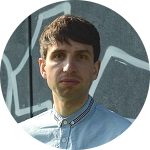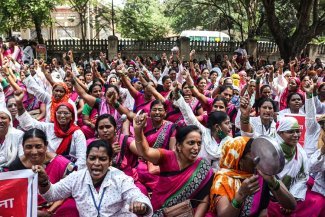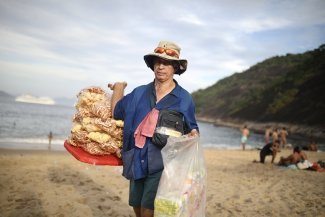
Chagossian families hold the Chagossian flag and celebrate at the Groupe Réfugiés Chagos headquarters in Mauritius on 25 February 2019 following the news that a top United Nations court had told the UK government to give up control of the Indian Ocean archipelago. It has been over a year since the judgement and the UK is yet to implement the court’s non-binding ruling.
Sabrina Jean says her 70-year-old father Serge’s greatest wish is to return to his home-land, but the UK authorities will not allow it. “When I ask him, ‘Where is your country?’, he always says, ‘My country is on Peros Banhos,’” she tells Equal Times. Serge is in exile from the Chagos Islands, an archipelago of around seven atolls and 60 islands in the Indian Ocean. The islands used to be home to between 1,500 and 2,000 Chagossians, but they were forcibly removed from their homeland between 1967 and 1973 to make way for a US military base on Diego García, the largest of the islands.
The Chagos Islands were part of the British colony of Mauritius until 1965, when it was severed to become part of the newly formed British Indian Ocean Territory (BIOT). The UK has retained control of the archipelago ever since, refusing to allow the expelled Chagossians to return home or for Mauritius, which gained independence from Britain in 1968, to reclaim sovereignty of the islands.
The expulsions were a deeply traumatic experience. John Pilger, the Australian journalist who helped draw attention to this issue with his 2004 documentary Stealing a Nation, described the process in an article for Al-Jazeera:
“People were herded into the hold of a rusting ship, the women and children forced to sleep on a cargo of bird fertiliser. They were dumped in the Seychelles, where they were held in prison cells, and then shipped onto Mauritius, where they were taken to a derelict housing estate with no water or electricity.”
Some of those Chagossians escaped poverty and discrimination in Mauritius and the Seychelles, resettling in the United Kingdom after they were given the right to claim British citizenship in the early 2000s. Today there are around 3,000 Chagossians and their descendants living in the UK, mostly in the town of Crawley, which is close to London Gatwick Airport.
Sabrina was born in Mauritius and moved to the UK in 2006 to help provide a better life for her three children (she brought over her father shortly after). She vows to keep up the fight for his right to resettle in the Chagos Islands, where the community had lived since the late 18th century. Sabrina says she is not sure “if it’s something about sadness” but she says that her father, who wishes to be buried in his ancestral land, talks very little nowadays.
A secret agreement
In the 1960s, while much of the world was undergoing a process of decolonisation, the US was extending its global military footprint in a bid to outpace its Cold War rival, the Soviet Union. The UK, an ally of the US, purchased the Chagos Islands from the then self-governing colony of Mauritius for £3 million to create the BIOT, which it then permitted the US to use for defence purposes for a period of 50 years (originally until 2016, recently ex-tended for another 20 years until 2036). Mauritius says that it was forced to give up the islands in 1965 in exchange for its independence in 1968. Britain, for its part, says that it is committed to “cede the territory to Mauritius when it is no longer needed for defence purposes”.
David Vine, author of Island of Shame: The Secret History of the U.S. Military Base on Diego Garcia and a lecturer in political anthropology at the American University in Washington DC, tells Equal Times: “The US government officials came up with the idea for the base. They convinced British officials to go along with it. They agreed to pay US$14million to gain the right to build a base on Diego García and to get the British government to do the dirty work of removing the Chagossians – the local Indigenous people from the entire archipelago – and they signed a secret agreement to this effect in 1966.”
By undertaking this operation secretly, both the US and the UK were able to avoid parliamentary, congressional and public oversight. No formal treaties were signed nor was there any official transfer of funds that required governmental approval. Instead, the UK received indirect support for its ‘independent nuclear deterrent’ and a discount for the Polaris nuclear missile.
“Both US and British officials came up with a plan to characterise the Chagossians as transient labourers or migrant workers if anyone bothered to ask about local people,” says Vine.
A 1966 diplomatic cable leaked in 2004 reveals the disregard exhibited by the head of Britain’s Colonial Office towards Chagos islanders at the time: “The object of the exercise is to get some rocks which will remain ours; there will be no indigenous population except sea-gulls…[.] Unfortunately along with the Birds [sic] go some few Tarzans or Men Fridays whose origins are obscure, and who are being hopefully wished on to Mauritius etc.”
A history of expulsions, an endless quest for justice
Vine describes the islands as “remote and isolated” which is “advantageous for a military base because it makes it easier to protect. It is also in the middle of the Indian Ocean, both far from anything but also within striking distance of a large part of a globe – from Southern Africa to the Middle East and East Asia”.
To this day, no-one can reach Diego García – home to Camp Thunder Cove (previously named Camp Justice until 2006) – unless they are in the US or British military, or they are civilian contractors. Today, the island is a US Navy and Airforce base, and is believed to have the presence of the National Security Agency (NSA), the Central Intelligence Agency (CIA), the National Aeronautics and Space Administration (NASA) and the new Space Force, the world’s first independent space military force founded in 2019 by then president Donald Trump.
Camp Thunder Cove is one of an estimated 800 US military bases or facilities in 83 countries and was reportedly used as a ‘black site’ for the CIA to interrogate terror suspects during the so-called War on Terror. “There is a track record of US bases displacing local people, Indigenous people, since World War II,” says Vine.
“There are, by my count, around 17 examples of local people who were displaced by a US military base - by its construction or by its expansion,” he says, citing the displacement of the Chagossians, the Bikinians, the Marshallese, Okinawans, the Inguhuit and the Viequenses as examples.
This “demonstrates the vulnerability of isolated, mostly Indigenous, non-European peoples who have suffered the effects of US imperialism,” says Vine in his most recent book, The United States of War: A Global History of America’s Endless Conflicts, from Columbus to the Islamic State.
The Chagossian community has been involved in several protracted legal cases against UK authorities. In 2000, the UK’s High Court ruled that Chagossians could return to the islands apart from Diego García. But in 2004 the UK used the royal prerogative to revoke the ruling. In 2007 both the High Court and Court of Appeal ruled the royal prerogative was unlawful. But in 2016, the UK’s highest court, the Supreme Court upheld a ruling from the House of Lords that Chagossians may not return home.
Consecutive UK governments have created feasibility studies and established a Marine Preservation Area (MPA). As a result, Chagossians are prevented from permanently resettling on viability and pollution grounds. A few small authorised and accompanied ‘heritage’ visits have been granted to Chagossians to spend a brief time on the islands in recent years. However, a Wikileaks cable from 2010 suggests that the Foreign Office deliberately created the MPA status to make it “difficult, if not impossible, [for Chagossians] to pursue their claim for resettlement on the islands”. In January 2021, the United Nations maritime court said the UK’s “claim to sovereignty over the Chagos Archipelago is contrary to the authoritative determinations made in [its] advisory opinion”. The decision upheld rulings by the International Court of Justice and a UN General Assembly vote in 2019 but the British government has rejected them all.
While it is important to hold the British to account, Vine says that the United States should not be let off the hook: “I think in some ways this is a very simple story of ongoing colonialism in the 21st century, perpetrated and perpetuated by both the British and US governments. The US government has long tried to deflect attention from itself and encouraged people to go talk to the British government if questions were ever raised. But this is a US base.”
For the Chagossians, justice entails the right to return to their homeland, governmental assistance from both the UK and US with the resettlement process, rebuilding local infrastructures to support returnees, full compensation, and the rectification of outstanding citizenship issues. But so far, true reparations and redress have not been forthcoming. “Everything that we asked the UK government, they have denied. They denied our rights to return. They put the largest military base on our island, and they put the Marine Protected Area to stop us returning,” says Sabrina, who notes that the UK has spent nearly £6 million in court proceedings against Chagossians. “In our mind we always said maybe it’s because we are Black people, we are poor, that’s why the UK government treats us like this.”
Owed billions in compensation
The British government says that “substantial compensation (around £15.5 million in cur-rent value) has been paid to Chagossians” since they were first forced to leave the islands. But Vine says that only some Chagossians received “small amounts of compensation five to 10 years after the last displacements, totalling around US$6,000 per recipient”. In 2016 the British government pledged a further “£40 million discretionary support package” to improve the situation of Chagossians in the diaspora, but four years later the government has only spent just over half a million pounds, almost entirely on heritage visits.
Vine estimates that the total compensation due to the whole population is “somewhere between US$5 billion and US$13 billion, taking into the account the value of the land which was stolen from them, as well as the value of lost income earnings possibilities and the consequential damages.
Sabrina says that some third generation Chagossians are now facing immigration issues. Current UK legislation says that children born to Chagossian parents in Mauritius or the Seychelles are to be regarded like other immigrants by the Home Office. This means that parents cannot pass on citizenship to their children if their children were born outside of the UK or a qualifying territory.
To remain in the UK, some Chagossians have to go through a costly naturalisation process. Falling behind on payments or administrative issues can potentially result in deportation to Mauritius.
In 2017, Crawley MP Henry Smith introduced a private member’s bill to help Chagossian descendants gain the right to become British citizens by reducing the cost of naturalisation from £10,000 to £2,000. However, the bill has only had its first reading in parliament and no date has been set for the second.
“We have been fighting for 53 years for our fundamental rights,” says Sabrina, now the chair of the Chagos Refugees Group UK. “The UK government has always hidden the struggle of the Chagossian community.”
Despite being in the UK for 15 years, she still feels a deep connection to the place of her father’s birth. “Even if you have not been born there, you can feel it,” she says, referring to Peros Banhos as “a paradise island”. “If tomorrow the UK government said they are giving back the country, I would be very happy to go”.









